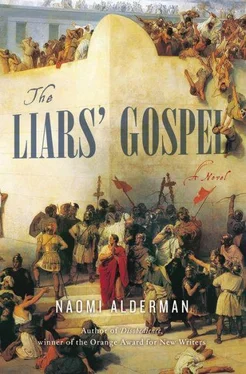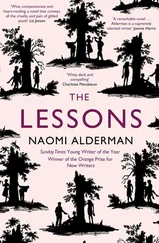Bar-Avo had not quite meant it but had not tried to avoid it either. He feels nothing afterwards, not grief or shock or pity, only perhaps a kind of surprise that it was so simple. And a kind of shock at himself, at his own cool capacity. He knows something about himself now that he didn’t know before, that it will not trouble him to kill a man. He thinks: this will be useful.
Av-Raham, when he hears, congratulates Bar-Avo in front of his men and says, “The first of many!” And Bar-Avo agrees. Yes. The first of many.
There are reprisals. Rome does not know precisely who attacked the bathhouse and killed the soldier, and Giora somehow managed to limp away on a broken ankle before he could be caught and questioned, so the Prefect’s men round up a few dozen young men and give them lashes in the marketplace. They execute five or six for “stirring up unrest.” Av-Raham sends gifts of money and promises of loyalty to the families of those young men. Rome wins nothing by this.
Bar-Avo marries soon after this, because the death has sharpened him somehow and the girls are not enough night after night. He has not got a child on any girl yet but at some point he will, he knows, and this thought, the thought that he might have to take a girl because he has given her a child, makes him think that it is time to marry.
He does not need to look too hard for a wife. There are a dozen girls of the right age — fifteen or sixteen — among the daughters of Av-Raham’s friends, and they are sweet and kind and think him handsome. There is one he likes, Judith, not just for the spread of her hips and her neat bottom, but because she seems to understand when he talks.
He has not slept with her; it is not right to do so with the daughters of these men. But once they sat together in a barn during a rainstorm and he told her how he longed to make his mother proud, and take care of her in her old years, and at this Judith leaned her head on his shoulder and said, “She doesn’t know how lucky she is to have a son like you.”
He had kissed her on the mouth and her kiss tasted faintly of cherries, and he tried to do more but she pushed his hands away and moved to put a little distance between them.
“You think everything will always come easily to you,” says Judith, “but one day there’ll be something you can’t get and then what will you do?”
“I’ll have to ask your father for you instead,” he says, and she laughs.
Judith’s father, one of the zealous men, is delighted by the offer of a new son-in-law and agrees rather swiftly.
She is a good girl, and gives him six children in six years, all of whom live to be bright toddlers and then on and on. They are four boys and two girls and Bar-Avo is surprised suddenly to be a father to many small delightful people whom Judith presents to him each evening washed for bed, who ask him if he has apples for them, who are delighted by the gift of a shiny stone or a piece of misshapen clay.
Judith, sensible as she is, does not ask questions about where he goes during the day or who he sees or what they tell him. She knows where they keep the daggers, wrapped in leather in the roof, and knows to keep the children from them. She knows what food to give him to take if he suddenly says that he will be away for a few days, and who to ask if he’s away for longer than he said. She is very calm if he happens to give her a message to tuck into the baby’s wrappings and pass to a man selling saltfish at the market.
His job, in these days, is to gather followers. A movement of revolution needs an army and each man must be recruited individually.
He travels to Acre, and then to Galilee, and talks to the strong men who are gathering their fishing nets in from the great lake. Their arms are knotted with muscles. Their thighs are bunched like tree trunks. Their bodies are meaty like bulls’. These are men who can thrust with a sword or a spear and pierce straight through another man’s body so that the point sees daylight on the other side. It is men like these that he wants. This is how to secure power, he sees. Work hard, be loyal to those who have much help to give you, but secure your own followers too. A day will come when Rome is gone. But before that, he will slowly become stronger and more powerful.
“Come and follow me,” he says to the fishermen, “follow me and free the country from tyranny.”
“We cannot follow you,” they say, “we have hauls of fish to pull in and families to feed.”
And he says, “Is not God the Master of all?”
And they say, “Yes.”
And he says, “Then will not God provide for His children, if they will only follow Him?”
And one of them, more curious than the others perhaps, says, “How shall we follow?”
And at that Bar-Avo gives them instruction. How they will become trusted friends of those who are zealous for the Lord. How they will listen for the code words that will show that the speaker is a true messenger from Bar-Avo. Such a messenger will tell them that he has “God alone as leader and master.” God alone. He says it again, and he knows how it feels to hear. No disgusting Emperor steeped in seamy sin upon his golden throne. No Roman army. No Prefect laying waste to good men’s lives upon his whims. God alone, he says to them, as leader and master.
“What of the priests?” says one, and Bar-Avo knows by this question that he has them.
“The priests connive with the Prefect and Rome and wheedle for their own fortunes. Haven’t you heard how rich the High Priest’s family is? Where do you think that money is from? It’s stolen from the Temple. And it’s blood money paid by Rome for our lives.”
And they believe, because they have heard the stories.
“God alone,” he says, “leader and master of all. None but God. God alone.”
They repeat it after him.
And when he walks on to the next village and the next most of the men stay, but giving him their word that he can call on them. And one or two — young men, men without families or men who long for the fight — walk with him. Strong fighting bodies, and he has them practicing their dagger thrusts in the evening and fashioning arrowheads. When he comes back to Jerusalem after three months’ walking, he has a score of men built like muscled oxen with him and another twenty times that number who have promised their right arms to the cause. He will not need them yet. But they will all come to Jerusalem to sacrifice for the festivals of pilgrimage, and then suddenly he will have an army.
“There is a logic to battles,” says Av-Raham, welcoming him back with a great feast and a calf spit-roasted over a fire of old olive wood. “There is a way to sense when the city is ready for war.”
All his friends are there: Matan and Ya’ir, and Giora, who broke his ankle in the fall from the roof and walks with a limp now but is still useful to the cause. Bar-Avo’s own mother has pride of place by the fire and his brothers and sisters with her, because now he is a man of some influence. It pleases him to see his family’s hands shiny with grease from the calf slaughtered in his honor. His wife is here too, her body newly strange and enticing to him after so many months away, and their children filled to the brim with meat and dozing like a half-dozen little puppies draped across her lap. And Av-Raham and the elder men, who look at him with new respect now. They sent several men out to recruit but none has come back with such good news as he.
“I can feel it is coming now,” says Av-Raham. “It will not be long. A year or half a year. Have you heard about the holy men each claiming to be the Messiah? This is a sure sign that the time is near. And the people who follow them? They will come to us.”
They drink wine and eat meat. Their moment is at hand.
Читать дальше












